Violist/Conductor
Yuri Bashmet
A Conversation with
Bruce Duffie
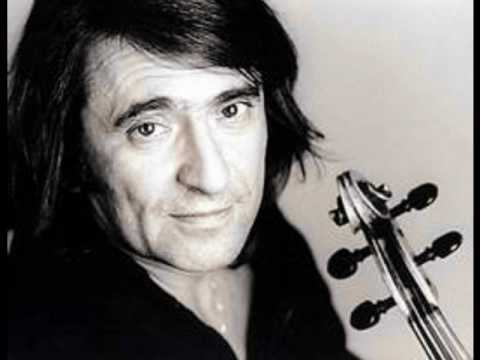
Violist/Conductor
Yuri Bashmet
A Conversation with
Bruce Duffie

The number of people who play the viola is small. Those who are good at it make up a select few. At the very top of the profession is Yuri Bashmet, who tours as soloist and also conducts the Moscow Soloists. He plays with the biggest names in classical music, and is, himself, a very special artist. That said, he is yet not a household name, though his prestige is growing all the time. I have placed a biographical sketch (based on publicity material from Sony) following this interview.
At the end of July of 1993, we met at the Ravinia Festival where Bashmet
was playing the Walton Viola Concerto with the Chicago Symphony Orchestra.
That was, as usual, on the first half of the concert, so we talked after
the intermission in the administrative offices inside the pavilion.
He was forthright and direct, though his English was somewhat cumbersome.
I have taken the liberty of making some slight corrections, but have left
a few of the nuances which show the flavor of his spoken sound. As
you can see, however, nothing escaped his notice . . . . .
Bruce Duffie: I appreciate your seeing me after a concert.
Yuri Bashmet: After my performance, yeah. Concert is not yet finished.
BD: Well, after your part of the concert...
YB: Yeah.
BD: Tell me some of the traits that make the viola unique among string instruments.
YB: Ah. Very interesting question. But if I would know how to answer, maybe viola will be not so mystic instrument. Viola has some mystery, in history, and today, also, and that is the main thing why viola is the most exceptional of string instruments. Some people say that the viola is the middle between violin and cello. I will tell you that from one point it's right, but from another it's historically wrong.
BD: Why?
YB: Because viola oldest instrument, oldest, historically.
BD: Older than the violin? And the cello?
YB: Older than the violin and the cello. This is the first point, and the second is that it's the center. The violin and cello go around this center.
BD: So you're the sun and everything revolves around you!
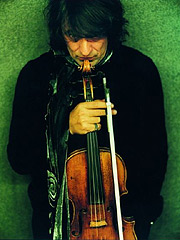 YB: Yeah. [Chuckles] That is my way of thinking about
it. Of course, now is a Renaissance for viola because a lot of modern
composers write for viola. That is a more concrete answer. I
do not know why it was not a solo instrument all the time in the world.
Other people say maybe it was nobody could play well the viola, but I don't
think so.
YB: Yeah. [Chuckles] That is my way of thinking about
it. Of course, now is a Renaissance for viola because a lot of modern
composers write for viola. That is a more concrete answer. I
do not know why it was not a solo instrument all the time in the world.
Other people say maybe it was nobody could play well the viola, but I don't
think so.
BD: There were always good violists, just not soloists?
YB: Yes. But to be soloist means to be more than good. It means to be the same time conductor, to read music and to produce with great ideas. Soloist is not only somebody who plays technically better. It is somebody who has very strong incentive for music.
BD: And a musical mind?
YB: Yes. But to be a good orchestra player it's maybe even more difficult than to be a soloist, because that needs to be very clever and very flexible, and very professional, and very gentle with others, colleagues. And it's very difficult. It means to take parallel with a simple life. It means to be very positive human being, you know?
BD: Sure.
YB: So what viola has special is first the tessitur.
BD: The tessitura.
YB: Yes. It is very special because main thing happens in the middle. If you go very high, it is the same like a violin, but it has much more tensitive. [Bashmet has coined a new word, but it's meaning is quite apparent.] It is very difficult. Could you believe violinists would play everything without the high string?
BD: [Chuckles] Not at all.
YB: But if you will do this it will be all time tensive, because...
BD: Oh, the tension on the instrument.
YB: Tension, yes, because if you will play with high string on the violin, it will be bright. Mostly it is bright on the top, on the E string. But if you do the same on the A, especially on the viola, it's not just bright; it is also deep. And it is also very tensitive. And then on the middle it is much more soft voice than the middle of the violin, because violin still high tuned sound. Then on the low strings, it is not as wide as a cello, of course, but it has produces sound stronger than cello...
BD: So it cuts through?
YB: Yes. And the same time, which is most important, it means that, the same like violin and cello, viola can be lyric, dramatic, beautiful, of course even more than others. Viola has beauty, but beauty is a little bit dangerous. Its beauty is like from devil you know? [Thinks for a moment] Like you can tell about tragic things through humor. This way in culture, viola is instrument like this. Viola never tell you just with sound, just "This is tragic," or "This is lyric," or "This is..." Viola can do this like Schubert music, through something very deep. And it means many meanings. Yeah?
BD: Sure.
YB: [In viola's sound.] Then, what is real strongest today, viola has some, not only tragic, but, I call it philosophic. "Cold, philosophic, tragic, sound." Which is like dangerous, like straight. You know, like: [sings two solemn, restrained yet emotion-filled, tones in the baritone range, the second a half step lower than the first and with a slight break in between] "Deeee, oooo" like this. Yeah. It's possible to produce the same on the cello and violin, but viola produce itself this sound. It means you must not manage this just with your hands. You just have to understand that now, in this moment, in music, its sound has to be like this, and it gives you immediately. This is most typical sound. Maybe that is the reason why today, when 20th century is almost over, this world begin to be crazy from some point. Everything is quicker, like a centrifuge. [Chuckles] It's like this now... [makes high-pitched whirring sound]. So maybe, for all this atmosphere, viola, from string instrument is one of the most interesting for composers, because at the same time you have tensitive, you have this, what I call "tragic, cold, philosophic, tragic sound," and beauty. Today, viola have renaissance, of course. And viola would never have this renaissance if it would be not some great viola players who can play concerts on the stage, solo. Because if no players, then composer will maybe never get this idea in his mind to write for viola, you know?
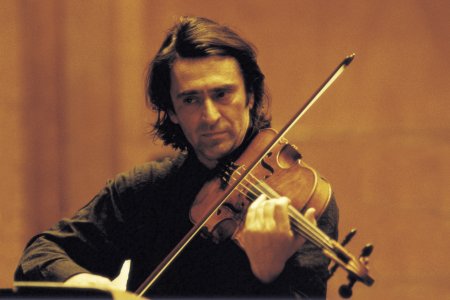
BD: Does it give you a sense of satisfaction, then, to be one of these violists who are bringing the sound to audiences and composers?
YB: Sure, sure. Maybe it's not very modest from my side, but I would tell you that I feel I know this very good, that I gave a lot for viola. [Chuckles] Not because it was not hard job for me, but it happened, that right man, and right time, in the right place. I was in Russia like a pioneer. I played first viola recital in the big hall in Moscow Conservatory in history of this country. And the same happened with me in Paris. And same happened in La Scala in Milano. The same happened in Tokyo and the same happened in Concertgebouw, and many other place, like Helsinki and Copenhagen.
BD: You were the first violist to give a solo recital?
YB: In history of these countries And it was for me a very important thing. Until today I'm not tired to be surprised from good things. [Chuckles]
BD: I hope good things continue to happen.
YB: Sure! For instance, for me always big, happy days when I met with the greatest orchestra in the world, like Chicago today. It's real and very happy when I meet these people, and this orchestra. It has great tradition, and it's not only great name. It's real. You have results. You can hear this sound of this orchestra, its quality. Everything! Strong like a tiger. This orchestra, it's... [as if he's just touched something that was too hot] ooh!
BD: [Laughs]
YB: I love. I love, really. And it is for me always great pleasure, honestly. Generally, in United States you have best orchestras. This is no question.
BD: Really?
YB: Of course!
BD: Hooray for us. [Laughs]
* * * * *
BD: How do you divide your time between concertos and solo recitals, and conducting?
YB: How I divide? I don't divide. Life divide for me. [Chuckles] It's very difficult to explain because it's not discipline, just anarchy.
BD: Well, do you prefer one to the other?
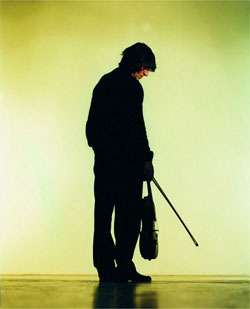 YB: [Emphatically]: No. No. I will tell you
that it is like I ask you whom you like or love more: beautiful black
woman or beautiful white woman. Or what do you prefer to play:
Bach or Handel? Or Schubert or Schumann or Brahms?
YB: [Emphatically]: No. No. I will tell you
that it is like I ask you whom you like or love more: beautiful black
woman or beautiful white woman. Or what do you prefer to play:
Bach or Handel? Or Schubert or Schumann or Brahms?
BD: Sure. I like them all, of course.
YB: Yeah, sure. And your question only one. When you're real love, then you have to love only this one point. So when I conduct, I get pleasure from conducting, and when I play, I tell myself, "No, I like to play more than conducting." When I conduct, then I tell to myself, "No, I like conducting more." So until I can manage this feeling, it's good. Because if I will mix in my mind, it's little bit different psychology. Not little bit, it's very different psychological things, and then it means that I would play not as good as I can, if I will mix the feelings.
BD: Are you a better conductor because you are a first-rate soloist?
YB: [Thinks for a moment] I don't know. But what I can tell you that after I begin conduct, my way of thinking in music begin a little bit to change, because I begin know score better than I did before. To hear all voices, to hear why, what happened, what way. And there's a lot questions and many answers. Then you play again solo, and you have more basic things about music. You know why I begin conducting? Because it was not enough viola repertoire. Just because of this. What I could do because I tour a lot. For instance, last time I played Schnittke Concerto, and now Walton. Then if I would be invited again, I will do, I don't know, Bartók or other viola concertos. And I have Mozart Concertante, of course, and Bruch Concerto. And there are 26 concertos dedicated for me. Five or six from this list are really very good, but still it's not Beethoven concerto, it's not Brahms concerto, it's not Tchaikovsky, not Prokofiev, not Sibelius.
BD: There's not the huge, familiar repertoire.
YB: Yes. It's not a huge, popular repertoire. So that was what happened with me in Europe. Because in United States I arrived much later. So in Europe already I did ten, fifteen rounds on the same prestige places, and then I had to do something! I can't repeat. It's possible repeat in five years the same, but it's better no. So it happened, and I founded orchestra, Moscow Soloists, and then I begin conducting.
BD: So let me turn question around. Are you then a better soloist because you have the experience of conducting?
YB: Yes. I think it's good thing for both. Good for both, but to be absolutely honest, I think if somebody play very well an instrument, better don't conduct. Better continue playing instrument, just generally. Because, for instance, Slava Rostropovich, he's already legend, historical legend, but he still play cello. I heard. It's incredible! I know in each his piece when he conduct, he have the same great ideas, new ideas. And he's still the same as cellist like a conductor, like somebody who think about music. But still people recognize him at first like a cello player. You know, you can't divide and have the same strong position on both of these. It's very rare when somebody can manage this. Very rare.
BD: But he comes very close.
YB: Yes. Once it was very, very funny and pleasant for me. I played on violin the Bach Double Concerto with my orchestra. With one violinist. It was somewhere in Sweden, some small town. We were touring, and in one town the review was very interesting. It was written that they were very happy with this performance. They said after Isaac Stern and David Oistrakh they never heard as Double Concerto like this. So it's fantastic. And then, but you know, "When he took viola, he played very well also on the viola." So because it's small town, they don't know me before. [both chuckle]
BD: They thought you were versatile.
YB: They thought I am violinist, that's all! I played, and then I conduct. So it's okay. But when I took the viola, it was also not bad, you know? [Laughter]
* * * * *
BD: You've made many recordings. Do you play the same in the recording studio as you do in the concert hall?
YB: [Emphatically] No. It's much more difficult for me to do recordings, because I must have this experience with the concerts. Not because I play for audience, but because with audience, some channel open which cannot be open on the studio. So that is different things. I prefer live recordings.
BD: Oh, recordings made during a concert.
YB: Yes. And then if some mistakes happen, then changes made.
BD: There are new works written for you. Do you advise the composers when they're writing the pieces?
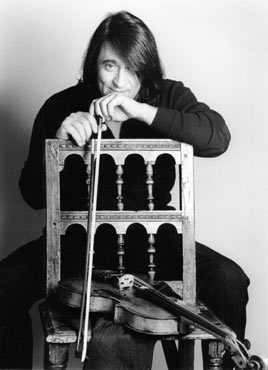 YB: Sometimes I ask them, sometimes they just do this and then
tell me that they begin work for viola concerto. They hope that I will
play it and sometimes I say sure. Just last two months I played four
new modern pieces for me, I mean with big orchestras. It was a little
bit too much, but it's because one year I didn't do one big premiere.
[Chuckles] So now I did four for two month. And two of them it
was real world premiere, and two already was written for another people before,
and I did for me was first time. First was Takemitsu, Japanese composer.
Very nice, beautiful piece called A String Around Autumn. Then
it was a fantastic concerto by Alexander Tchaikovsky [born in Moscow in 1946].
I did it in London, my festival, I did four concerts with LSO in Barbican,
and it was world premiere. It was my order. I asked him.
And also he wrote for me second piece which I just did it with small orchestra
ten days ago. It was a variation of Stravinsky's theme for viola and
orchestra, very good. [Bashmet is probably thinking of the Shostakovich
Sinfonia "The Thirteenth" for viola and strings, an arrangement by
Alexander Tchaikovsky of Shostakovich's String Quartet no, 13 in B-flat
minor, Op. 138; Bashmet has conducted this with his Moscow Soloists.
Shostakovich dedicated this quartet to the original viola player of the Moscow-based
Beethoven Quartet, Vadim Borisovsky. The Sinfonia comprises
one single continuous movement, beginning slowly with an unaccompanied viola
theme, and moving onto an extended fast central section which features the
viola players tapping the belly of the instruments with the wood of the bow
to create a percussive effect. The work ends with a long viola solo,
unaccompanied except for echoes of the earlier bow-taps from the second violins.]
And one Jewish composer, Mark Kopytman [b. 1929]. He lives in Tel Aviv.
I did this performance in Moscow. This was more political thing, but
it's beautiful piece, beautiful.
YB: Sometimes I ask them, sometimes they just do this and then
tell me that they begin work for viola concerto. They hope that I will
play it and sometimes I say sure. Just last two months I played four
new modern pieces for me, I mean with big orchestras. It was a little
bit too much, but it's because one year I didn't do one big premiere.
[Chuckles] So now I did four for two month. And two of them it
was real world premiere, and two already was written for another people before,
and I did for me was first time. First was Takemitsu, Japanese composer.
Very nice, beautiful piece called A String Around Autumn. Then
it was a fantastic concerto by Alexander Tchaikovsky [born in Moscow in 1946].
I did it in London, my festival, I did four concerts with LSO in Barbican,
and it was world premiere. It was my order. I asked him.
And also he wrote for me second piece which I just did it with small orchestra
ten days ago. It was a variation of Stravinsky's theme for viola and
orchestra, very good. [Bashmet is probably thinking of the Shostakovich
Sinfonia "The Thirteenth" for viola and strings, an arrangement by
Alexander Tchaikovsky of Shostakovich's String Quartet no, 13 in B-flat
minor, Op. 138; Bashmet has conducted this with his Moscow Soloists.
Shostakovich dedicated this quartet to the original viola player of the Moscow-based
Beethoven Quartet, Vadim Borisovsky. The Sinfonia comprises
one single continuous movement, beginning slowly with an unaccompanied viola
theme, and moving onto an extended fast central section which features the
viola players tapping the belly of the instruments with the wood of the bow
to create a percussive effect. The work ends with a long viola solo,
unaccompanied except for echoes of the earlier bow-taps from the second violins.]
And one Jewish composer, Mark Kopytman [b. 1929]. He lives in Tel Aviv.
I did this performance in Moscow. This was more political thing, but
it's beautiful piece, beautiful.
BD: Is music political?
YB: Generally? No. Not at all. It's because, you know, if I live in Russia - previous Soviet Union, with Brezhnev - and I played Schubert Sonata Arpeggione, and then begin the era of Andropov, Chernenko, Gorbachev, then Yeltsin. What change in my thinking about Schubert Sonata Arpeggione? Nothing changes.
BD: Nothing changes?
YB: Of course not. How it can be connected? It's like a religion, like some spirit thing. It's different. But, of course, when something happen, then the musicians went around each other all together. For instance, they do concert for Armenian Disaster a few years ago. I played in London. It is also from some point it is political, because there were international great musicians and they put all this together, but it's very positive. Still we played music, but it went to these people. And the same happened in Stalin time. For instance, some composers wrote pieces, and it was called Stalin Always in Life, oratorium, or something like this. And then, in our day, the same composer wrote a piece and calls it For People Who Was Killed By Stalin, in memory of these people. The same composer! That is prostitution, you know, but generally politic and music must be not together.
BD: Well, let me ask the big question, then: what is the purpose of music?
YB: Purpose? I don't know this word.
BD: Why music? What is its use? What is its meaning? What is its real ultimate value?
YB: [Chuckles] The best what I can tell you about this is that I don't know. Second, I can tell you that if I would know, then music would be not music. You know what I mean? If I will know this and I will tell you this with words, then music will lose what music is. I think music is highest life of human spirit, and it's not a dry spirit. Spirit which have connection with heart, with emotional things, with philosophical things. It's like a cosmos. It's kind of all information for human being. That is music. And also including everything, everything. Good, bad things, life and death, and black and white, sex and anti-sex. [Laughter] Everything, you know? Love and hate. And it doesn't means what language composer speaking with. When you listen to Tchaikovsky, Japanese and American people, and Italian people, and Austrian people, and French people, they love Symphony numbers 5 and 6. It's most popular symphonies. And Romeo and Juliet, they love this. Why? It' not because he is Russian composer; of course not. He just was born in Russia, and he had this Russian information, and Russian mentality in his blood, and all these things. But he is like this. He is international because he spoke about main human being things. It doesn't means what language. All people understand it when you listen to this. It's Romeo and Juliet. It's universal why I could tell you this. But people understand this from his music. So he speaks about this, and it is important.
BD: So music is universal, then.
YB: Sure! Sure! Great music, real music. Mozart's music, it's not Austrian music. It's great music.
BD: What makes some music great?
YB: Great? What I just told you now. When composer speak about main human being things, with a talent.
* * * * *
BD: What advice do you have for young violists?
YB: For young violists? The most strong things, I think, from my opinion, is that they must not have conflicts that they are violist. And to have not this conflict, they have already a lot of possibilities for this. At first it is some very good soloist who goes around the world, and they can see that it has success. And today, of course, still a lot of jokes exist about viola players, you know.
BD: Tell me a good viola joke.
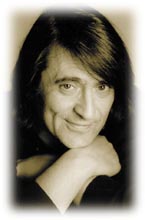 YB: Okay. [Chuckles] I can tell you one of thousand.
Question was put to concertmeister of the orchestra: "Listen, you have
to kill two people: viola player and conductor. Concertmeister of viola
section and conductor. Whom you will kill first?" He said, "First
conductor, and then viola player." "Why?" "It first business
and then pleasure."
YB: Okay. [Chuckles] I can tell you one of thousand.
Question was put to concertmeister of the orchestra: "Listen, you have
to kill two people: viola player and conductor. Concertmeister of viola
section and conductor. Whom you will kill first?" He said, "First
conductor, and then viola player." "Why?" "It first business
and then pleasure."
BD: [Laughs]
YB: Ha! Many, many thing. But I can give you another one. Why viola jokes very short?
BD: Why?
YB: Because violinist have to remember.
BD: That's cute, and it pokes the violinists! Speaking of this, if a violin soloist breaks a string, he changes with the concertmaster. Have you ever broken a string and changed with the principal viola?
YB: Yeah, it happened. It happened with me in Helsinki when I did Schnittke. And it happen in the Concertante once, but it's more difficult because viola different sizes, and... [Gestures with outstretched hands as if measuring different lengths] it can be like this, can be like this. Violins all the same, just little bit different. But violas can be like this, [chuckles] can be like this.
BD: Why? Why are they not standardized?
YB: That is mystery, what I tell you. It's not yet standard, it can't be standard.
BD: Do you always use the same instrument, or do you have two or three instruments that you play?
YB: No, I have my one instrument I play from 1971. It's already 20, more than 20 years marriage. It's old Italian, Testore. 1758. [From Bashmet's website... Bashmet plays a Testore viola made in 1758, which he bought in 1971. It is the same make as Mozart's viola - with just three years difference in the instruments' ages! Bashmet has actually played Mozart's instrument (housed in the birthplace museum in Salzburg), the first player since the composer to do so, performing the Sinfonia concertante at the Mozarteum Salzburg. He was intrigued at the individual characteristics of each instrument; his the more projecting, Mozart's more suitable for chamber music, but with a very rich colour.]
BD: Is playing the viola fun?
YB: [Takes a breath.] I don't know fun. It's pleasure, you mean? Yeah. Of course. Of course. All your body vibrate with this different sound, you know? It's physical fun also. And generally if you get music results it doesn't mean on viola, or to conduct, or piano, or violin, which I do, all these things. It is musical pleasure. Of course. And the viola it is something sexual not fixed. You know, violin it's like "she." Of course, bass, it's "he." And viola it is, I think it is like when you see painting by Raphael. A lot of portraits with some famous citizens that time, and around the stage some beautiful boys, you know? Beautiful boys. And boys faces are so beautiful that if you look just at face, there's beauty, as beautiful as girl. And it's not girl, it's boy. So this kind of beauty between sexual, this is viola.
BD: So you have the best of both, then.
YB: Yes. [Chuckles]
BD: Thank you so much.
YB: Thank you. I think some good things happened now.
BD: Thank you for coming to Chicago; I hope that you will return.
YB: I hope, also.
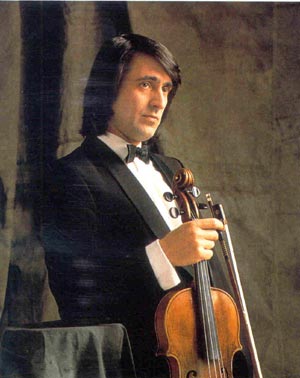
| Yuri Bashmet was born in 1953 in Rostov-on-Don in Russia and spent
his childhood in Lvov in the Ukraine. He began studying at the Moscow Conservatoire
at the age of eighteen, first with Vadim Borisovsky, violist of the Beethoven
Quartet, and later with Feodor Druzhinin. He subsequently became the youngest
person ever to be appointed to a professorship at the Moscow Conservatoire.
In 1976, Bashmet won first prize at the International Viola Competition in
Munich, which launched his international career.
Yuri Bashmet has inspired many composers to write for him. He enjoyed an especially close and productive relationship with Alfred Schnittke, and premiered the composer's Viola Concerto at the Concertgebouw in Amsterdam in 1986. The work has since become firmly established in the repertoire. Other works written for Bashmet include Georgian composer Giya Kancheli's Viola Concerto, which the violist premiered at the Berlin Festival, The Myrrh Bearer by John Tavener, a concerto by Poul Ruders and Sofia Gubaidulina's Viola Concerto, which he premiered with the Chicago Symphony Orchestra and Kent Nagano in April 1997. Bashmet also gave the world premiere of Benjamin Britten's recently edited Double Concerto for violin and viola with Gidon Kremer and the Hallé Orchestra conducted by Kent Nagano in Manchester in February 1998. In 1992 Bashmet began working with a new group, Moscow Soloists, which he directs himself. This group is composed of musicians nominated by professors at the Moscow Conservatoire as the cream of the new generation of string players. The Moscow Soloists have been rapturously received in Moscow, Athens, Amsterdam, Paris and at the BBC Promenade Concerts in London. In a number of major concert halls, including La Scala in Milan and the Concertgebouw in Amsterdam, Bashmet has been the first violist ever to give a solo recital. He has appeared on many occasions with Sviatoslav Richter and has performed chamber music with many other leading artists, including Natalia Gutman, the Borodin Quartet, Gidon Kremer, Viktoria Mullova, Mstislav Rostropovich and Maxim Vengerov. He has appeared with nearly all the world's leading orchestras, including the Berlin Philharmonic, Royal Concertgebouw, Boston Symphony, Chicago Symphony, Montreal Symphony and Los Angeles Philharmonic and London's Philharmonia Orchestra. The London Symphony Orchestra presented a four-concert Yuri Bashmet festival in 1993 at the Barbican. Bashmet was "International Artist in Residence" for the 1998 Bath International Festival.
== Names which are links refer to my interviews
elsewhere on my website. BD
|
=== === === === ===
--- --- ---
=== === === === ===
© 1993 Bruce Duffie
This conversation was recorded on July 30, 1993 at the Ravinia Festival
in Highland Park, Illinois, and portions were broadcast on WNIB in 1993 and
1998, and on WNUR in 2004. This transcription was made in December,
2006, and was posted on this website at that time.
To see a full list (with links) of interviews which have been transcribed and posted on this website, click here.
Award - winning broadcaster Bruce Duffie was with WNIB, Classical 97 in Chicago from 1975 until its final moment as a classical station in February of 2001. His interviews have also appeared in various magazines and journals since 1980, and he now continues his broadcast series on WNUR-FM, as well as on Contemporary Classical Internet Radio.
You are invited to visit his website for more information about his work, including selected transcripts of other interviews, plus a full list of his guests. He would also like to call your attention to the photos and information about his grandfather, who was a pioneer in the automotive field more than a century ago. You may also send him E-Mail with comments, questions and suggestions.